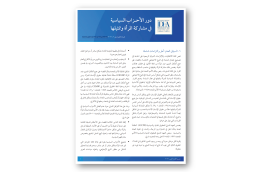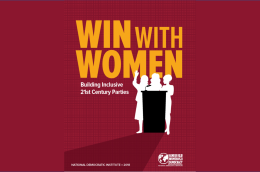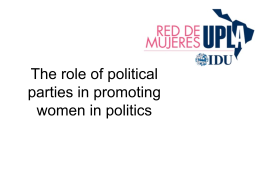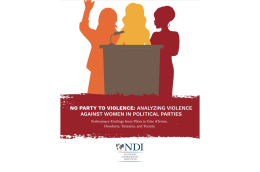Political Parties
Main navigation
What you need to know:
-
Myllene Bosibori's political journey exposes deep gender, ethnic, and financial barriers facing Kenyan women candidates.
-
Sexual harassment, biased systems, and economic hardship continue to block women’s fair access to political leadership.
When Myllene Bosibori decided to run for Kajiado North MP in 2022, she never thought it would be an uphill task.
However, her experience was not horrifying. Having come from the minority ethnic group, Myllene tells the Nation that she faced double discrimination of coming from a small ethnic group and being a woman. She recounts how on many occasions she was told to go seek elective politics in her native Kisii region.
Myllene also bitterly recalls how she was asked for sexual favours and a bribe to be given a ticket for one of the popular political parties. “When I refused, it was handed to another person. It is so hard for a woman seeking political leadership to fairly compete with men.”
Full article published by Nation Africa here.
Image by Nation Africa
The conservative Protestant party SGP has again voted down a proposal to formally recognize women’s eligibility for political and administrative roles, maintaining a decades-long stance that continues to limit women's participation despite previous legal rulings and internal activism.
On Saturday, party delegates overwhelmingly rejected a motion to enshrine in the party’s core statutes that women are welcome to hold political or leadership positions. The vote ended 299 to 53 against the proposal. Only party delegates were allowed to vote, not the broader membership.
The proposal was submitted by Lilian Janse and her local chapter in Vlissingen. Janse became the first woman to hold office for the SGP in 2014 when she joined the city council. Despite that milestone, the party's founding regulations still state that women who enter politics are acting "in conflict with their calling."
Stem op een Vrouw (Vote for a Woman) director Devika Partiman responded to the vote by urging women within the party not to give up. “There is no magical formula, but things really will change eventually,” she said. Partiman said she was not surprised the proposal was rejected, but she did not expect the margin to be so wide. She pointed out that only designated male delegates — often strict followers of party rules — were allowed to cast ballots. “That is the biggest problem,” she said.
According to Partiman, many regular SGP members support changing the party statutes, making the outcome “regrettable.” She added, “It would be a good idea if the men who do agree with the changes would speak out publicly, so there are visible role models.” However, she acknowledged the difficulty, noting that speaking against the leadership might hurt their own prospects in the party.
Full article published by the Netherlands Times on 24 May 2025.
Image by Netherlands Times
Labour has cancelled its national women’s conference and restricted all-women shortlists as it awaits full guidance from the equalities watchdog, drawing criticism from transgender rights and gender-critical campaigners.
The party’s governing body, the national executive committee (NEC), met on Tuesday to sign off plans to cancel the women’s conference, which was due to take place before the party’s annual conference in Liverpool in September.
The Equality and Human Rights Commission’s interim advice, published after the supreme court decision that the term “woman” in the Equality Act refers only to a biological woman, has suggested that voluntary organisations should apply that rule.
The NEC had been told the party was at risk of a legal challenge if it went ahead with the conference, according to LabourList, and could face protests and direct action if the conference proceeded as usual on the basis of self-identification.
Full article published by The Guardian on 20 May 2025.
Image by The Guardian
Nigerian women across different social statuses have been urged to become more politically conscious and actively involved in partisan politics as the next general elections in the country draw closer.
They were encouraged to take action during a one-day summit held in Lagos on Tuesday, organised by the Women Environment and Youth Development Initiative (WOYODEV), a non-governmental organisation focused on women and youth matters.
The forum, themed “From Margins to Mainstream: Empowering Women for Political Participation in Nigeria,” brought together scores of women and young girls from diverse backgrounds and political parties, including those living with disabilities.
Speaking at the event, the convener and executive director of WOYODEV, Mrs Tosin Apiriola-Ajayi, emphasised the importance of the summit, outlining three major objectives.
According to her, the summit aims to promote strong and sustainable feminist movements and coalitions to foster the active participation of women in politics, challenge social norms—including gender discrimination—that often relegate women to the background in political power sharing and decision-making, and empower women to take leadership roles.
Full article published by MSN on 15 May 2025.
Image credits: Tribune Online
The result of the federal election was shocking but it wasn’t surprising.
It was a resounding message from voters – and we would be foolish not to listen.
The truth is, the Liberal party didn’t lose because of campaign tactics or some leadership missteps alone. We lost because our policies failed to resonate. And they failed to resonate because, too often, they were built without the input of the very Australians we needed to win over – women, young people, multicultural communities and urban voters.
Too many of our policies seemed disconnected from the daily realities of modern Australia. The cost of living, housing, secure jobs, climate and education are dominating the concerns of millions – yet when asked how we’d address them we gave voters little reason to believe we understood the scale of the problem, let alone have credible answers.
The Liberal party’s massive defeat leaves it in dire straits. Where to from here?
To chart a credible path forward, we must return to first principles. The Liberal party was once defined by its broad reach – a party of the “forgotten people”, where aspiration met compassion and economic freedom was balanced by social responsibility. That legacy, championed by the party founder Robert Menzies, meant putting the concerns of ordinary Australians at the centre of political life.
Full article here published by The Guardian.
Image source: The Guardian
The Bangladesh Nationalist Party strongly disagreed with the Constitutional Reform Commission on its proposal for a quota of 10 per cent parliamentary seats for young candidates.
The Bangladesh Jamaat-e-Islami rather preferred emphasis on nominating young candidates but disagreed to the proposed quota.
On the other hand, the newly floated National Citizen Party favoured the quota, with the recommendation that 35 years should be the maximum age for the eligibility of youth under the quota system.
In response to the National Consensus Commission’s 166-point questionnaire on key reforms, the youth-dominated NCP also proposed lowering the voter age from 18 to 16.
At the same time, it opposed reducing the minimum age for a parliamentary candidate from 25 to 21, as suggested in the reform proposals.
The BNP, in its feedback to the NCC, wrote the party disagrees to the youth quota as it considers the nomination of candidates is a matter of a political party’s policy and, therefore, imposing any constitutional obligation regarding quota is inappropriate.
Avoiding giving any specific opinion about the proposed 10 per cent quota, the Jammat wrote that nominating candidates from among the youth should be emphasised.
During their dialogues with the NCC, several other political parties also opposed the youth quota in the parliament.
Nagarik Oikya presidium member Zinnur Chowdhury Dipu and Rashtra Sangskar Andolan organiser Syed Hasibuddin Hossen told New Age that their parties, too, disagree to the option for the 10 per cent youth quota.
Hasibuddin, however, said his party does not discourage young candidates to contest in the parliamentary elections.
Read here the full article published by New Age on 14 April 2025.
Image by New Age











